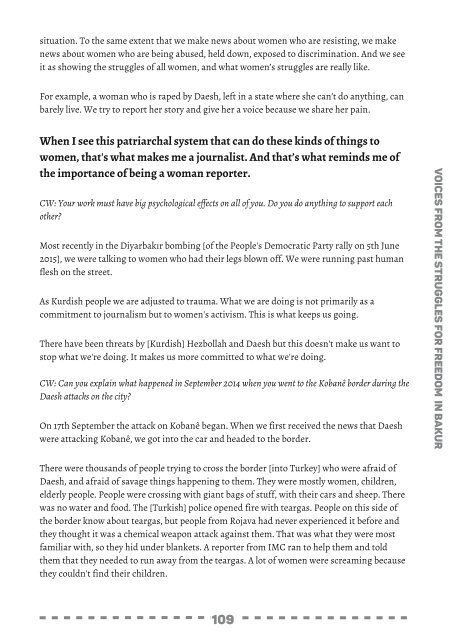STRUGGLES
Struggles-for-autonomy-in-Kurdistan
Struggles-for-autonomy-in-Kurdistan
You also want an ePaper? Increase the reach of your titles
YUMPU automatically turns print PDFs into web optimized ePapers that Google loves.
situation. To the same extent that we make news about women who are resisting, we make<br />
news about women who are being abused, held down, exposed to discrimination. And we see<br />
it as showing the struggles ofall women, and what women’s struggles are really like.<br />
For example, a woman who is raped by Daesh, left in a state where she can’t do anything, can<br />
barely live. We try to report her story and give her a voice because we share her pain.<br />
When I see this patriarchal system that can do these kinds ofthings to<br />
women, that's what makes me a journalist. And that’s what reminds me of<br />
the importance ofbeing a woman reporter.<br />
CW: Your work must have big psychological effects on all ofyou. Do you do anything to support each<br />
other?<br />
Most recently in the Diyarbakır bombing [ofthe People's Democratic Party rally on 5th June<br />
2015], we were talking to women who had their legs blown off. We were running past human<br />
flesh on the street.<br />
As Kurdish people we are adjusted to trauma. What we are doing is not primarily as a<br />
commitment to journalism but to women's activism. This is what keeps us going.<br />
There have been threats by [Kurdish] Hezbollah and Daesh but this doesn't make us want to<br />
stop what we're doing. It makes us more committed to what we're doing.<br />
CW: Can you explain what happened in September 2014 when you went to the Kobanê border during the<br />
Daesh attacks on the city?<br />
On 17th September the attack on Kobanê began. When we first received the news that Daesh<br />
were attacking Kobanê, we got into the car and headed to the border.<br />
voices from the struggles for freedom in bakur<br />
There were thousands ofpeople trying to cross the border [into Turkey] who were afraid of<br />
Daesh, and afraid ofsavage things happening to them. They were mostly women, children,<br />
elderly people. People were crossing with giant bags ofstuff, with their cars and sheep. There<br />
was no water and food. The [Turkish] police opened fire with teargas. People on this side of<br />
the border know about teargas, but people from Rojava had never experienced it before and<br />
they thought it was a chemical weapon attack against them. That was what they were most<br />
familiar with, so they hid under blankets. A reporter from IMC ran to help them and told<br />
them that they needed to run away from the teargas. A lot ofwomen were screaming because<br />
they couldn't find their children.<br />
109


